
The economy of Jamaica is heavily reliant on services, accounting for 71% of the country's GDP. Jamaica has natural resources and a climate conducive to agriculture and tourism. The discovery of bauxite in the 1940s and the subsequent establishment of the bauxite-alumina industry shifted Jamaica's economy from sugar, and bananas.

The United Fruit Company was an American multinational corporation that traded in tropical fruit grown on Latin American plantations and sold in the United States and Europe. The company was formed in 1899 from the merger of the Boston Fruit Company with Minor C. Keith's banana-trading enterprises. It flourished in the early and mid-20th century, and it came to control vast territories and transportation networks in Central America, the Caribbean coast of Colombia and the West Indies. Although it competed with the Standard Fruit Company for dominance in the international banana trade, it maintained a virtual monopoly in certain regions, some of which came to be called banana republics – such as Costa Rica, Honduras, and Guatemala.
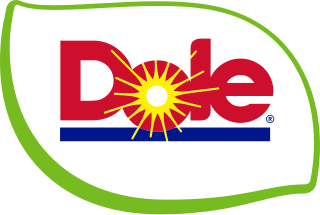
Dole plc is an Irish-American agricultural multinational corporation headquartered in Dublin, Ireland. The company is among the world's largest producers of fruit and vegetables, operating with 38,500 full-time and seasonal employees who supply some 300 products in 75 countries. Dole reported 2021 revenues of $6.5 billion.
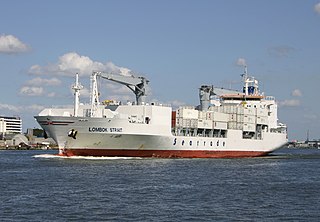
A reefer ship is a refrigerated cargo ship typically used to transport perishable cargo, which require temperature-controlled handling, such as fruits, meat, vegetables, dairy products, and similar items.

Minute Maid is a product line of beverages, usually associated with lemonade or orange juice, but which now extends to soft drinks of different kinds, including Hi-C. Minute Maid is sold under the Cappy brand in Central Europe and under the brand "Моя Семья" in Russia and the Commonwealth of Independent States. Minute Maid was the first company to market frozen orange juice concentrate, allowing it to be distributed throughout the United States and served year-round. The Minute Maid Company is owned by The Coca-Cola Company, the world's largest marketer of fruit juices and drinks. The firm opened its headquarters in Sugar Land Town Square in Sugar Land, Texas, United States, on February 16, 2009; previously it was headquartered in the 2000 St. James Place building in Houston.
Boston Beach is a coastal community on the north coast of the island of Jamaica, with a public beach which is one of the few beaches in Jamaica attracting surfers. It is located nine miles east of the town of Port Antonio.

Fyffes plc is a fruit and fresh produce company. The Fyffes brand is most closely associated with the banana industry, although it is applied to a wide range of fruits and fresh produce, including the Fyffes Gold Pineapples, and Fyffes melons.
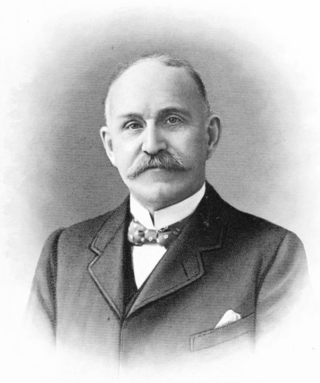
Andrew Woodbury Preston was a prominent American businessman at the turn of the 20th century.

Minor Cooper Keith was an American businessman whose railroad, commercial agriculture, and cargo liner enterprises had a major impact on the national economies of the Central American countries, as well as on the Caribbean region of Colombia. Keith's work on the Costa Rican railroad to the Caribbean, a project begun by his uncle Henry Meiggs, led him to become involved in the large-scale export of bananas to the United States. In 1899, Keith's banana-trading concerns were absorbed into the powerful United Fruit Company, of which he became vice-president. Keith was also involved in a number of other business ventures, including gold mining in Costa Rica and real estate development in the US.
Established in 1970, grower-owned Turbana Corporation, is a leading importer of tropical produce in North America, including bananas, plantains, pineapples, and ethnic tropicals. Turbana was the first organization to bring Fair Trade Certified bananas to North America. An advocate in sustainability and social consciousness, Turbana has developed the farming communities in the banana and plantain-growing regions in Colombia over the past 44 years through its social foundation, Fundauniban. Turbana gives a portion of every purchase to Fundauniban, contributing to the $250 million the foundation has invested in social and economic projects for education, housing, infrastructure, and environmental protection since 1987. Turbana is owned by Uniban, the world's largest co-op of banana growers and the world's largest producer of plantains and Fair Trade Certified bananas, and Fyffes, number one importer of bananas and one of the largest tropical produce importers and distributors in Europe.

In political science, the term banana republic describes a politically and economically unstable country with an economy dependent upon the export of natural resources. In 1904, the American author O. Henry coined the term to describe Guatemala and Honduras under economic exploitation by U.S. corporations, such as the United Fruit Company. Typically, a banana republic has a society of extremely stratified social classes, usually a large impoverished working class and a ruling class plutocracy, composed of the business, political, and military elites. The ruling class controls the primary sector of the economy by way of the exploitation of labor. Therefore, the term banana republic is a pejorative descriptor for a servile oligarchy that abets and supports, for kickbacks, the exploitation of large-scale plantation agriculture, especially banana cultivation.
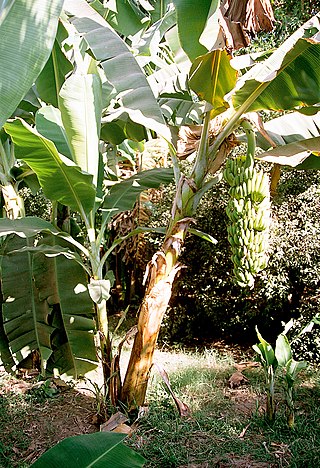
Banana production in the Caribbean is widespread. Bananas are cultivated by both small farmers and large land holders. The plant is perennial and is planted either in pure stands or in mixed cultivation, such as in Jamaica. Countries where bananas are a main export crop are Belize, Costa Rica, Dominican Republic, Honduras, Jamaica, Guadeloupe, Dominica, Martinique, Saint Lucia, Saint Vincent and the Grenadines, Grenada, Trinidad and Tobago, Nicaragua, Panama, Suriname and Colombia.
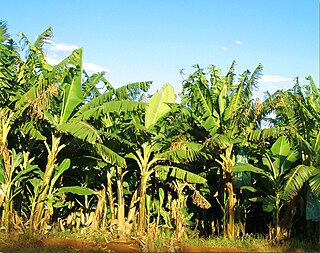
A banana plantation is a commercial agricultural facility found in tropical climates where bananas are grown.

Banana boat is a descriptive nickname that was given to fast ships, also called banana carriers, engaged in the banana trade. They were designed to transport easily spoiled bananas rapidly from tropical growing areas to North America and Europe. They often carried passengers as well as fruit.
Although bananas have been planted for thousands of years, the development of an intercontinental trade in bananas had to wait for the convergence of three things: modern rapid shipping (steamships), refrigeration, and railroads. These three factors converged in the Caribbean in the 1870s, and would lead to the development of large-scale banana plantations, usually owned and operated by highly integrated large corporations such as Dole and Chiquita Brands International.
M. Levin & Company, Inc., is an American full-line wholesale produce distribution company located in Philadelphia, Pennsylvania. The company was established in 1906, and is the oldest family-owned produce wholesaler at the Philadelphia Wholesale Produce Market. Levin is one of the largest ripeners and banana food service distributors in the Mid-Atlantic region, ripening over 30,000 boxes weekly. The company is owned and operated by its third- and fourth-generation family members.

The banana industry is an important part of the global industrial agrobusiness. About 15% of the global banana production goes to export and international trade for consumption in Western countries. They are grown on banana plantations primarily in the Americas.
Fruit ketchup is a condiment prepared using fruit as a primary ingredient. Various fruits are used in its preparation, and it is also used as a spread and marinade, among other uses. Banana ketchup is a type of fruit ketchup that is common in the Philippines.

Rosario di Giorgio was a steam cargo ship built in 1907 by the Nylands Verksted of Kristiania for Bernhard Hanssen of Flekkefjord. The ship was primarily employed as a fruit carrier during her career. She was named after Rosario di Giorgio, manager of Baltimore branch of Atlantic Fruit Company, and brother of Joseph di Giorgio, founder of the company.
Alfred Constantine Goffe was a Jamaican businessman noted for his role in the banana trade.




















